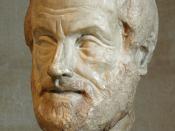Aristotle is widely accepted as one of the greatest philosophers of all time. In ancient Greece he studied under Plato and taught Alexander the Great. His work is still thoroughly studied and respected by the academic world to this day, so when one decides to refute Aristotle, they had better have a good reason and some solid proof. A. F. Mackay is one such individual. He focuses on a ÃÂpuzzling, apparent anomaly that is surprising to find in a philosophical genius like AristotleÃÂ, which is that ÃÂ[he] appears to use an elegant short argument [referred to as AristotleÃÂs Fast Argument by Mackay] to attack PlatoÃÂs doctrine of the good, which argument equally appears to attack [his] own doctrine of the good.ÃÂ MackayÃÂs argument is surprisingly strong and well put-together, and I fully agree with him. Here I will briefly summarize and critique the major points of his argument.
Right off the bat, Mackay attacks the Fast Argument.
In this argument, Aristotle attempts to make the point that PlatoÃÂs Form of the Good is not ÃÂthe chief goodÃÂ based upon the fact that its eternality does not necessitate its standard of goodness. He says that a white object is no whiter than another simply because it lasts longer. Mackay points out that the independence of an objectÃÂs degree of whiteness from its degree of duration is not at all relevant to the independence of the degree of goodness and the eternality of the Form of the Good. He further notes that the duration of pleasure increases that qualityÃÂs goodness, so why not the duration of the Form of Good? One must wonder why Aristotle finds the Form of Good to be closer related to whiteness than pleasure or countless other qualities or experiences enhanced by duration. ÃÂ[Even] if we grant...


